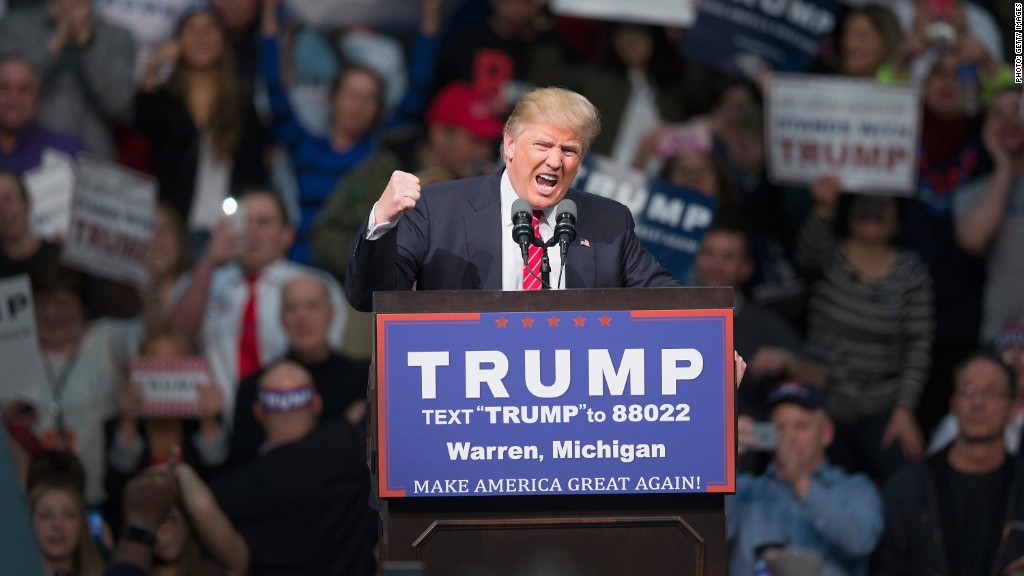
The angry primary voter is the election year manifestation of a 25-year trend gnawing away at American self-confidence.
Call it one America, two economies.
The S&P 500 is up more than 200% over the past seven years. Home prices rose 11% last year, and a quarter of housing markets are showing record high home prices.
Millions of jobs have been added and the unemployment rate is 4.9%, approaching a level many economists consider full employment.
That is not the economy discussed around American kitchen tables. Stock market returns, low mortgage rates, cheap gas prices? No. There, the focus is on closed factories, stagnant wages, student loan debt and declining opportunity for anyone without a college degree.
Related: Which candidate would be better for stocks?
That pessimism is evident again and again in exit polling this primary season. Voters say the American economy is going in the wrong direction and they only trust outsiders to fix it.
These voters are terrified that their household income is down $3,700 since 2007. At $53,657, median household income now stands at 1995 levels.
It hasn't happened overnight, or even under one president. Both parties have pursued free trade deals and embraced China's move into the global economy. Brand new technologies and globalization have made it easier and cheaper to produce overseas. The American middle class buys cheaper consumer goods but loses millions of jobs to outsourcing.
In 2001, there were 352,600 manufacturing establishments in the U.S. employing 15.8 million workers, according to Census figures. By 2013, that number had dwindled to 11.3 million workers at 292,100 factories.
The conventional wisdom since the early 1990s has been that America will transition from low-skilled factory work to highly-skilled high-tech manufatcuring and service-sector jobs. This new American economy favors tech geniuses, workers with specific technical skills and college graduates.
Related: Starbucks CEO: Voters are embracing 'fool's gold'
But this more nimble, globalized world and changing American demographics have elbowed some workers right out of the labor market. In the 1950s, about nine in 10 white men were employed or looking for work. But over the past six decades, they have slowly and steadily dropped out of the labor market as the female and Hispanic workforce has expanded.
It's a malaise entirely missed by the political establishment, by many in the media and by business elites. And it's the single biggest storyline of this election.
American voters feel left behind by an economy they believe benefits investors, bosses, party leaders, the super-rich and status quo politicians.
Related: Donald Trump's 500 businesses would pose 'unprecedented ethical dilemma'
Donald Trump has energized millions of Americans with his boundless self-confidence. Bernie Sanders has struck a chord with young people who feel cheated by a college degree that doesn't earn what they thought and student loans that will hold them back longer from buying a home, starting a family, saving and investing.
Essentially, our economic self esteem is in the dumps. But here is a curious wrinkle. When asked about their personal economy roughly six out of 10 primary voters in exit polls say they are "holding steady." It's a remarkable disconnect. Economists score the economy a solid B or B+ and primary voters give it an F.


